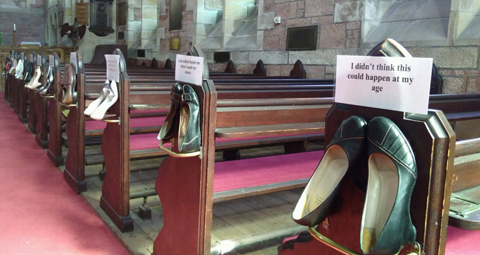BY Daniel Harkins | February 1 | ![]() 0 COMMENTS
0 COMMENTS ![]() print
print

Scotland’s faiths unite to raise awareness of domestic abuse
Scotland’s Faith communities have come together with the support of the Catholic Church to raise awareness of the ‘hidden’ problem in society of domestic abuse.
The Scottish Interfaith Group on Domestic Abuse (IfGoDA) meet under the auspices of the Scottish Catholic Safeguarding Service and are hoping for support from parishes to boost their work busting myths about an issue which affected almost 60,000 people last year, according to Police Scotland statistics.
IfGoDA is made up of representatives from faith communities across Scotland, including the Catholic Church, the Episcopal Church, the Church of Scotland, and the Amina Muslim Women Resource Centre.
Using an eye-catching exhibit, the group hopes to change attitudes towards domestic abuse, to encourage people to speak out about the problem and to reach out to those they think may be in abusive relationships.
The ‘Souls of our Shoes’ exhibit (above right) has been touring the country, and has collected more than 70 shoes from supporters and victims—including a pair from the late Bishop John Mone of Paisley Diocese, an early supporter of the groups’ efforts.
Raising awareness
Having first began their work around 20 years ago, IfGoDA have now launched a new video to spread awareness of domestic abuse, a problem, the volunteers say, which can affect men and women, the young and old, and the rich and poor.
“It could be a high court judge, it could be a primary school teacher, it could be your next door neighbour—it’s everybody and anybody,” said Jean Urquhart, who is a Catholic Church representative on the group.
Hilary Moran, of Christian charity The Mothers’ Union and the Episcopal Church, also sits on the group, which she said is about ‘challenging preconceptions and standing together as people of God with those who are abused.’
She explained that abuse ‘is mainly coercive control.’
“It’s psychological—constant texts saying’ you have to be home by…why aren’t you home?’—it’s constant controlling behaviour, anything that restricts your freedom,” she said.
The groups’ work has been endorsed by Bishop John Keenan of Paisley Diocese. He said: “I am very pleased to support the work of the Scottish Interfaith Group On Domestic Abuse which raises awareness of this important issue, but also offers information about the practical support available.”
“Their message is a simple one of faith and solidarity; that those who experience abuse may never be alone or without hope.”
Outreach
The IfGoDA volunteers have taken their work into prisons and are beginning to reach out to schools.
And they are hoping Catholic parishes can help them fight the issue by putting up phone numbers for domestic abuse charities on church noticeboards—and in particular in toilets where they can be accessed in private.
The group, which are available to give talks and presentations in parishes, recently found one visit to a school had a dramatic impact on the pupils.
Ms Urquhart said: “There was paper on the walls for people to write their experiences on, but no one was willing.
“But then a teacher wrote up that she had been in an abusive situation and had found a way out and was now happy. And that opened up the floodgates for the children to write their feelings.
“The kids were very thoughtful, with one boy writing that he was in that [abusive] situation.”
Ms Urquhart said it was important to change attitudes in schools. She said: “Bishop John [Keenan] told me that he was in a school once and someone said, ‘oh, one slap is OK.’ That is what we have to change.
“Young people growing up now, there’s something wrong with respect—it’s to do with respecting themselves and each other, and teaching them what its like to have a respectful relationship, whether that is with a pal or a sister or whoever.”
A ‘daily occurrence’
There are around 58,000 to 60,000 incidents of domestic abuse a year in Scotland.
However, the IfGoDA believe it is a problem that can often lie undetected.
Ms Urquhart said she knew one woman for years before finding out that she had ended her marriage because of abuse. “People are ashamed—it’s not their fault, but they are ashamed,” she said. “It’s not something people wear on the outside.
“We want people to be a friend to others. To give people an opportunity to open up to you. To ask how they are doing.”
The Souls of our Shoes exhibition has toured cathedrals and shopping centres across the country, and IfGoDA said that First Minister Nicola Sturgeon had even donated a pair of high heels to the cause.
At a recent exhibition in Largs, one woman told Mothers’ Union about her own story of abuse.
“My church’s Soles of our Shoes project allowed me to tell my story of growing up in a house where domestic abuse was a daily occurrence,” Victoria Johnson said.
“Looking down the pews at the shoes I stopped at a pair of a very small child’s boots. They resonated powerfully with me because my abuse started when I was a very small child and looking at those little boots I could see me as that small child again.
“The fear, the sense of panic, the stomach-churning anxiety that would overwhelm me and the profound sense of loss stood with me again.
“The Soles of our Shoes project has given me the opportunity to reflect on how far I’ve come and reminded me how happy my life is now compared to then.
“That doesn’t mean I’m free from worry but rather my life is peaceful and content —something I thought many years ago I was too damaged to achieve.”
— The IfGoDA film, Walking Through Domestic Abuse, can be viewed on YouTube
Am I in an abusive relationship? A Women’s Aid Guide
Everyone has arguments, and everyone disagrees with their partners, family members and others close to them from time to time. And we all do things at times that we regret, and which cause unhappiness to those we care about. But if this begins to form a consistent pattern, then it is an indication of domestic violence and abuse.
The answers to the following questions may help you:
Has your partner tried to keep you from seeing your friends or family?
Has your partner prevented you or made it hard for you to continue or start studying, or from going to work?
Does your partner constantly check up on you or follow you?
Does your partner unjustly accuse you of flirting or of having affairs with others?
Does your partner constantly belittle or humiliate you, or regularly criticise or insult you?
Are you ever afraid of your partner?
Have you ever changed your behaviour because you are afraid of what your partner might do or say to you?
Has your partner ever destroyed any of your possessions deliberately?
Has your partner ever hurt or threatened you or your children?
Has your partner ever kept you short of money so you are unable to buy food and other necessary items for yourself and your children or made you take out loans?
Has your partner ever forced you to do something that you really did not want to do?
Has your partner ever tried to prevent you from taking necessary medication, or seeking medical help when you felt you needed it?
Has your partner ever tried to control you by telling you that you could be deported because of your immigration status?
Has your partner ever threatened to take your children away, or said he would refuse to let you take them with you, or even to see them, if you left him?
Has your partner ever forced or harassed you to have sex with him or with other people?
Has your partner ever tried to prevent your leaving the house?
Does your partner blame his use of alcohol or drugs, mental health condition or family history for his behaviour?
Does your partner control your use of alcohol or drugs (for example, by forcing your intake or by withholding substances)?
If you answered yes to one or more of the above questions, this indicates that you may be experiencing domestic abuse.










